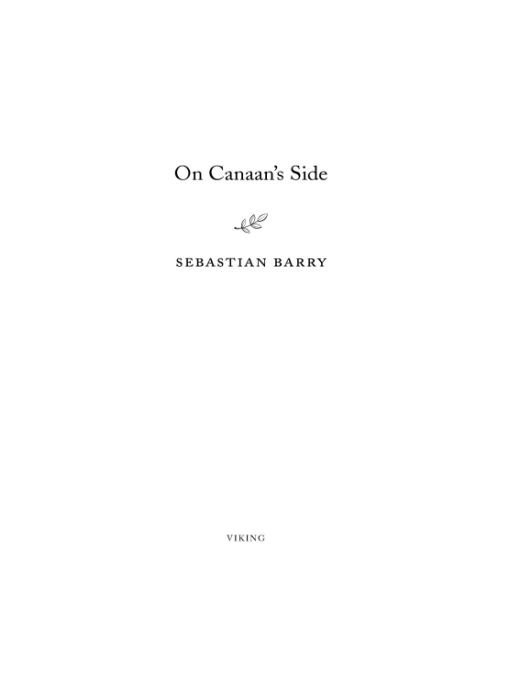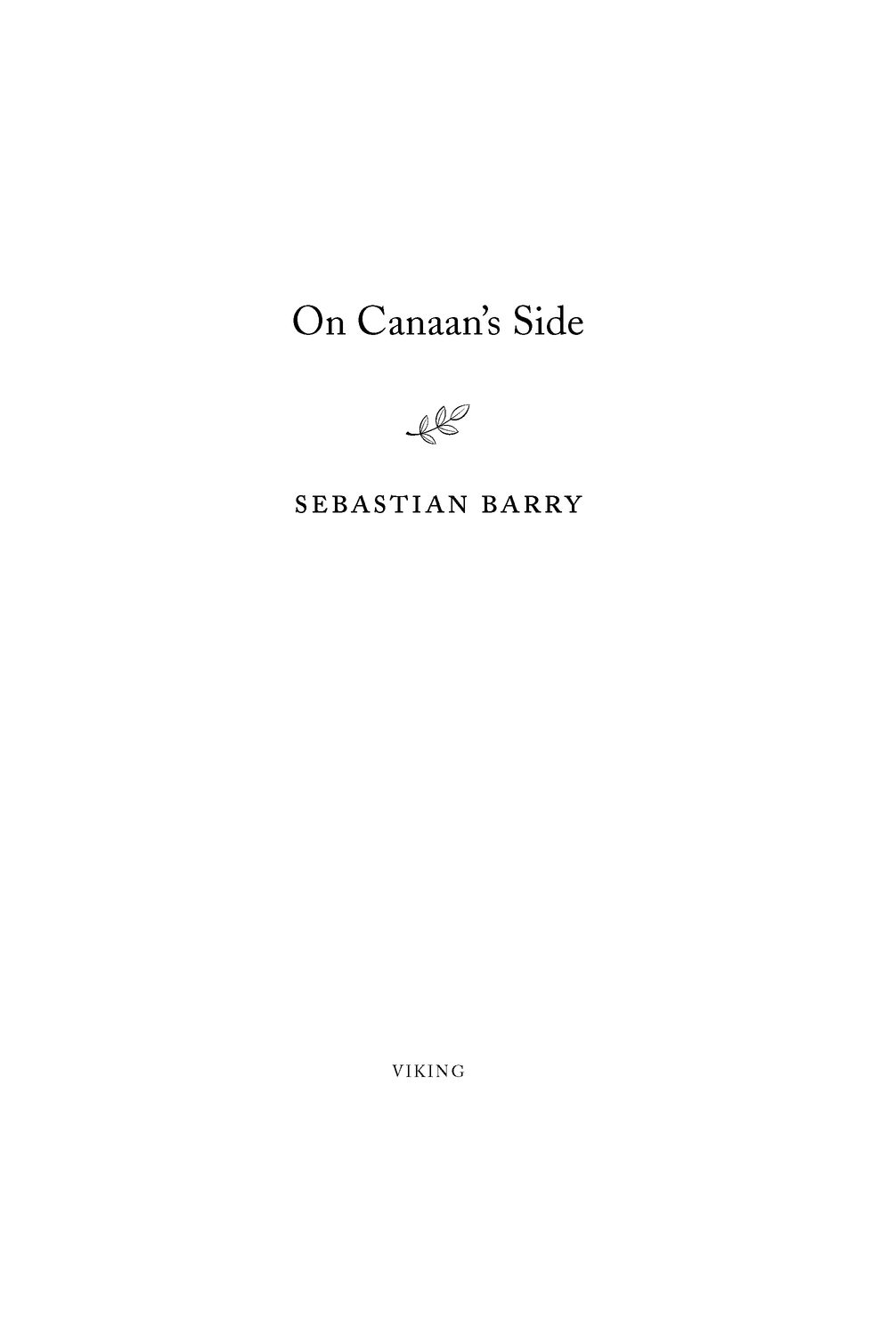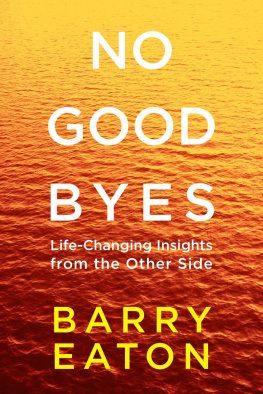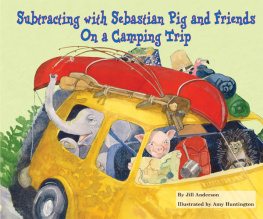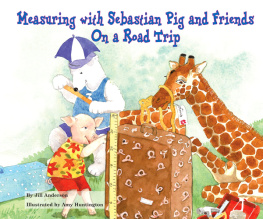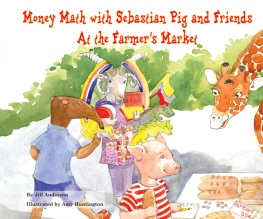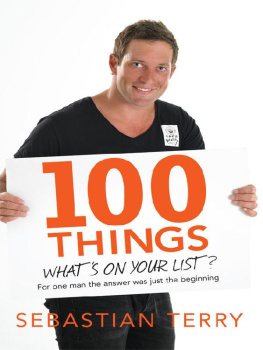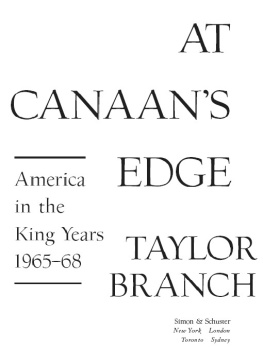Table of Contents
by the same author
fiction
THE SECRET SCRIPTURE
A LONG LONG WAY
ANNIE DUNNE
THE WHEREABOUTS OF ENEAS MCNULTY
plays
THE STEWARD OF CHRISTENDOM
SEBASTIAN BARRY: PLAYS I
OUR LADY OF SLIGO
WHISTLING PSYCHE
THE PRIDE OF PARNELL STREET
DALLAS SWEETMAN
TALES OF BALLYCUMBER
poems
THE WATER-COLOURIST
FANNY HAWKE GOES TO THE MAINLAND FOR EVER
THE PINKENING BOY
For Dermot and Bernie
Livin on Canaans side, Egypt behind
Crossed over Jordan wide, gladness to find.
AMERICAN HYMN
PART ONE
First Day without Bill
Bill is gone.
What is the sound of an eighty-nine-year-old heart breaking? It might not be much more than silence, and certainly a small slight sound.
When I was four I owned a porcelain doll given me by a strange agency. My mothers sister, who lived down in Wicklow, had kept it from her own childhood and that of her sister, and gave it to me as a sort of keepsake of my mother. At four such a doll may be precious for other reasons, not least her beauty. I can still see the painted face, calm and oriental, and the blue silk dress she wore. My father much to my puzzlement was worried by such a gift. It troubled him in a way I had no means to understand. He said it was too much for a little girl, even though the same little girl he himself loved with a complete worship.
One Sunday about a year after I was first given it, I insisted on bringing it to mass with me, despite the long and detailed protestations of my father, who was religious in the sense he hoped there was an afterlife. He bet all his heart on that. Somehow a doll was not a fitting mass-goer in his estimation.
As I carried her in stubbornly to the pro-cathedral in Marlborough Street, by some accident, possibly the great atmosphere there of seriousness, she started to fall from my arms. To this day I am not certain, not entirely, that I didnt let her go on some peculiar impulse. But if I did, I immediately regretted it. The ground of the cathedral was flagged and hard. Her beautiful dress could not save her, and her perfect face hit the stone and smashed worse than an egg. My heart broke for her in the same instance, so that the sound of her destruction became in my childish memory the sound of my heart breaking. And even though it was a babyish fancy, I do wonder now if it might not be a sound like that an eighty-nine-year-old heart makes, coming asunder from grief a small, slight sound.
But the feeling of it is like a landscape engulfed in floodwater in the pitch darkness, and everything, hearth and byre, animal and human, terrified and threatened. It is as if someone, some great agency, some CIA of the heavens, knew well the little mechanism that I am, and how it is wrapped and fixed, and has the booklet or manual to undo me, and cog by cog and wire by wire is doing so, with no intention ever to put me back together again, and indifferent to the fact that all my pieces are being thrown down and lost. I am so terrified by grief that there is solace in nothing. I carry in my skull a sort of molten sphere instead of a brain, and I am burning there, with horror, and misery.
God forgive me. God help me. I must settle myself. I must. Please, God, help me. Do You see me? I am sitting here at my kitchen table, with its red Formica. The kitchen is gleaming. I have made tea. I scalded the pot, even in my distraction. One spoon for me and one for the pot. I let it brew, as always, waited, as always, the yellow light in the window facing the sea as solid-looking as an old bronze shield. In my grey dress of heavy linen, that I regretted buying the moment I paid out the money for it in Main Street years ago, and still regret, though it is warm in this struggling weather. I will drink the tea. I will drink the tea.
Bill is gone.
The legend of my mother was that she died in giving birth to me. I broke free, my father said, like a pheasant from cover, noisily. His own father had been steward of Humewood estate in Wicklow, so he knew what a pheasant looked like, breaking from cover. My mother died just as the need for candlelight failed, at the first instance of the dawn. It was in Dalkey village, not far from the sea.
For many years that was just a story to me. But when I was pregnant with my own child, it suddenly became vivid, and as if it was present time. I sensed her in that cramped delivery room in Cleveland as I strained to get him out. I never had any true thought of my mother till then, and yet in those moments I do not think any human being was ever closer to another. When the baby was laid on my breast at last, me panting like an animal, and that matchless happiness surged through me, I cried for her, and the worth and weight of those tears was more to me than a kingdom.
When I was shown the Catholic catechism at four, in the little infants school attached to the castle, and the very first question was posed, Who made the World?, I knew in my heart that the teacher Mrs OToole erred in providing the answer God. She stood before us and read out the question and answer in her wren-sized voice. And I might have been inclined to believe her, because she was impressive to me at four in her skirt as grey as a seal in Dublin Zoo, and she had been very kind to me as I came in, and had given me an apple. But the world, as I thought she ought to have known, was made by my father, James Patrick Dunne, not quite at that time, but later to be, chief superintendent of the Dublin Metropolitan Police.
The legend of my father was that he had led the charge against Larkins men in Sackville Street. When Larkin came over OConnell Bridge in a fake beard and moustache, and walked up through the marble corridors of the Imperial Hotel, and out onto a balcony, and began to give a speech to the hundreds of workers gathered below, which had been forbidden by edict, my father and the other officers ordered the waiting constables forward, with batons drawn.
When I first was told this story as a child, on the very evening it happened, I misunderstood, and thought my father had done something heroic. I added in my imagination a white horse, upon which he rode with ceremonial sword drawn. I saw him rush forward like in a proper cavalry charge. I gasped at his chivalry and courage.
It was only years later I understood that he had advanced on foot, and that three of the working men had been killed.
Old matters. And not much to do with the grief of the present except it gives me my bearings. Now Ill draw breath and start properly.
When I came back in from the funeral my friend Mr Dillinger had come into the hallway while I was out and left flowers but not waited for me. They were very costly flowers, and he had put a little note against them, and written, To my dear friend Mrs Bere, in the time of her great loss. It touched me, truly. I am sure if Mr Nolan was still alive he also would have crept in. But it would not have been welcome. Maybe if I didnt know what I know now, maybe if Mr Nolans death had not occurred when it did, I might have gone on imagining him my closest friend in life. It is so strange that his death and the death of my grandson Bill have happened so close together in time. All things come in threes, no doubt this is true. The third death will be my own. I am eighty-nine years old and will end my life very shortly. How can I live without Bill?

